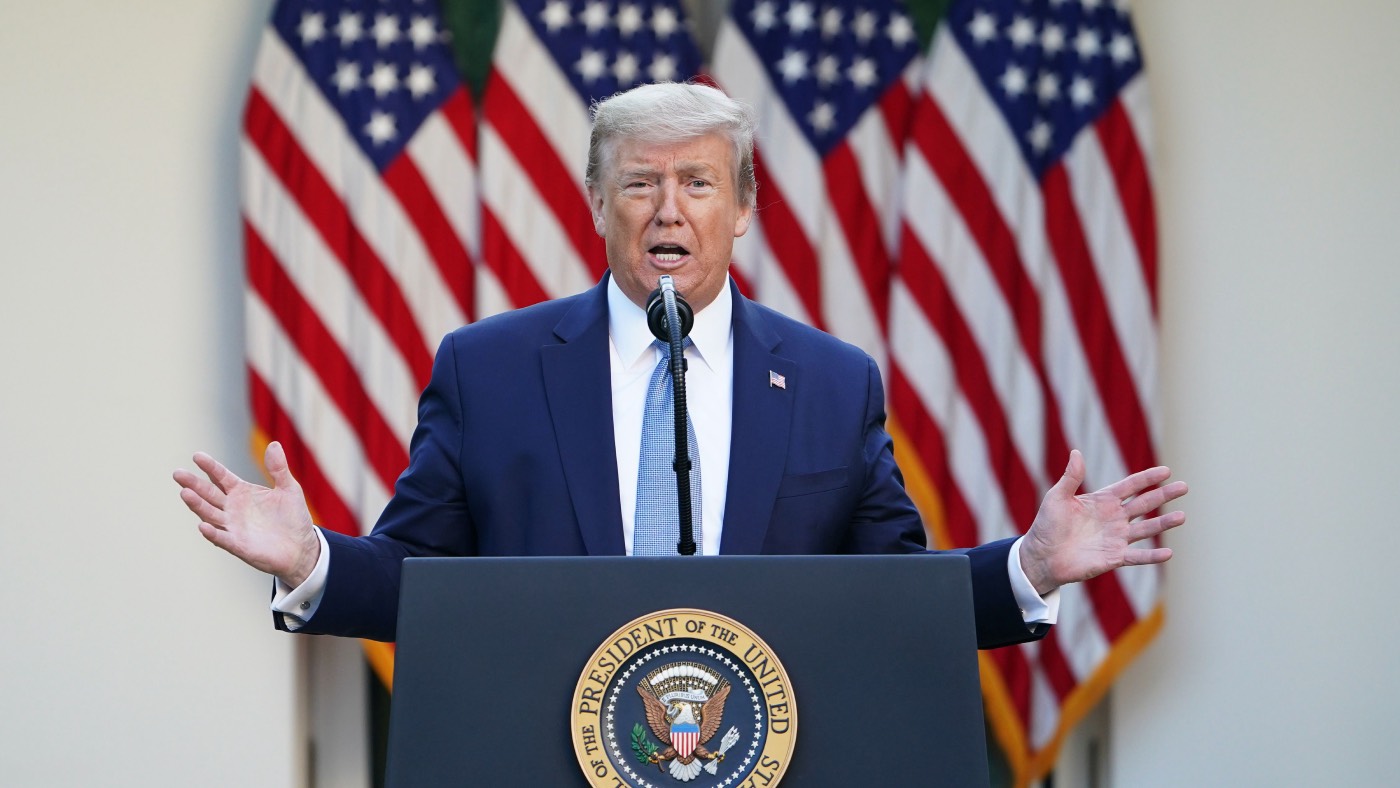Trump claims coronavirus has ‘passed peak’ in US - has it?
President accused of electioneering as he prepares to reopen the country

A free daily email with the biggest news stories of the day – and the best features from TheWeek.com
You are now subscribed
Your newsletter sign-up was successful
Donald Trump has claimed the US has “passed the peak” of new Covid-19 cases and predicted some states would reopen within weeks.
Speaking at yesterday’s daily briefing, the US president said: “The battle continues but the data suggests that nationwide we have passed the peak on new cases. Hopefully that will continue, and we will continue to make great progress.”
He added that new reopening guidelines would be announced on Thursday after he speaks to governors. “We’ll be the comeback kids, all of us,” he said. “We want to get our country back.”
The Week
Escape your echo chamber. Get the facts behind the news, plus analysis from multiple perspectives.

Sign up for The Week's Free Newsletters
From our morning news briefing to a weekly Good News Newsletter, get the best of The Week delivered directly to your inbox.
From our morning news briefing to a weekly Good News Newsletter, get the best of The Week delivered directly to your inbox.
Is he right?
Trump’s plan to start reopening the US has already been greeted with disquiet. His taskforce had tentatively set the date of reopening for 1 May, but Trump suggested it would be earlier, claiming 29 states “are in good shape”.
The Guardian points out that he offered no evidence for his claim that the US is passed the peak and the The Washington Post said he used “more hopeful language than his own medical experts are willing to use”.
Dr Anthony Fauci, the US’s chief immunologist, who has not appeared at the last two press briefings, had said on Tuesday that the 1 May date was “a bit overly optimistic”.
A free daily email with the biggest news stories of the day – and the best features from TheWeek.com
CNN says the president’s “make American open again campaign” is a dangerous “election-year political device that positions him as leading the resurgence and those who oppose him as laggards holding America back”.
Public health officials and political leaders have warned that “most of the country is not conducting nearly enough testing to track the path and penetration of the coronavirus in a way that would allow Americans to safely return to work”, reports The New York Times.
For example, Los Angeles Mayor Eric Garcetti has said that large gatherings are not likely to resume until 2021. “Until there’s either a vaccine, some sort of pharmaceutical intervention, or herd immunity, the science is the science,” he said, adding that public health officials had made clear it has “miles and miles to walk before we can be back in those environments”.
Asked about the risk of reopening the nation too soon, Trump cited mental health issues and said: “There’s also death involved in keeping it closed.”
–––––––––––––––––––––––––––––––For a round-up of the most important stories from around the world - and a concise, refreshing and balanced take on the week’s news agenda - try The Week magazine. Start your trial subscription today –––––––––––––––––––––––––––––––
The US figures
The Telegraph points out that a few hours after Trump’s briefing, Johns Hopkins University said the US had posted 2,569 deaths in the past 24 hours, “a new global record”.
The US currently has the highest number of officially reported coronavirus cases in the world: 644,089, which makes up 31% of the world's 2,083,607 confirmed cases. With a death toll of 28,529 (global deaths are at 134,669), it also has the most fatalities.
Asked why the US accounted for such a significant proportion of the global deaths, Trump referred to China and asked: “Does anybody really believe the numbers of some of these countries?”
Dr Deborah Birx, coronavirus response coordinator on the White House taskforce, said that, over the past six days, the rate of new cases has declined across the country. There were nine states with fewer than 1,000 cases each and fewer than 30 new cases daily, she said.
Meanwhile, Vice President Mike Pence said more than 3.3 million tests have been “conducted and completed”. He claimed that 24% of all counties in the country have not reported a single case of Covid-19 and half of all states have fewer than 2,500 cases each.
“We’re going to reflect on the fact that, as the president said, there will be areas of the country that will require continued mitigation and strong efforts and there will be other areas of the country that will be given guidance for greater flexibility, the president has so directed our team,” Pence said.
-
 Local elections 2026: where are they and who is expected to win?
Local elections 2026: where are they and who is expected to win?The Explainer Labour is braced for heavy losses and U-turn on postponing some council elections hasn’t helped the party’s prospects
-
 6 of the world’s most accessible destinations
6 of the world’s most accessible destinationsThe Week Recommends Experience all of Berlin, Singapore and Sydney
-
 How the FCC’s ‘equal time’ rule works
How the FCC’s ‘equal time’ rule worksIn the Spotlight The law is at the heart of the Colbert-CBS conflict
-
 A Nipah virus outbreak in India has brought back Covid-era surveillance
A Nipah virus outbreak in India has brought back Covid-era surveillanceUnder the radar The disease can spread through animals and humans
-
 The stalled fight against HIV
The stalled fight against HIVThe Explainer Scientific advances offer hopes of a cure but ‘devastating’ foreign aid cuts leave countries battling Aids without funds
-
 Obesity drugs: Will Trump’s plan lower costs?
Obesity drugs: Will Trump’s plan lower costs?Feature Even $149 a month, the advertised price for a starting dose of a still-in-development GLP-1 pill on TrumpRx, will be too big a burden for the many Americans ‘struggling to afford groceries’
-
 Covid-19 mRNA vaccines could help fight cancer
Covid-19 mRNA vaccines could help fight cancerUnder the radar They boost the immune system
-
 Can TrumpRx really lower drug prices?
Can TrumpRx really lower drug prices?Today’s Big Question Pfizer’s deal with Trump sent drugmaker stocks higher
-
 The new Stratus Covid strain – and why it’s on the rise
The new Stratus Covid strain – and why it’s on the riseThe Explainer ‘No evidence’ new variant is more dangerous or that vaccines won’t work against it, say UK health experts
-
 Why are autism rates increasing?
Why are autism rates increasing?The Explainer Medical experts condemn Trump administration’s claim that paracetamol during pregnancy is linked to rising rates of neurodevelopmental disorder in US and UK
-
 RFK Jr. vaccine panel advises restricting MMRV shot
RFK Jr. vaccine panel advises restricting MMRV shotSpeed Read The committee voted to restrict access to a childhood vaccine against chickenpox